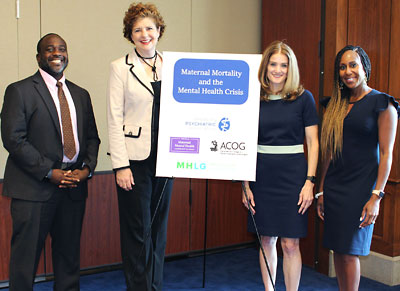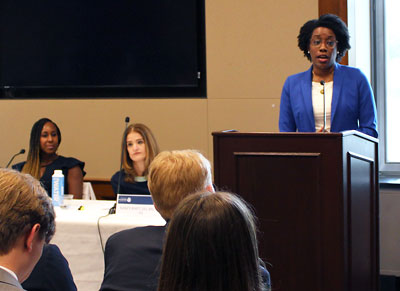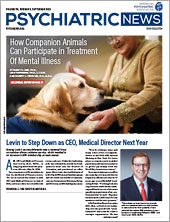Over the past two decades, the maternal death rate in the United States has more than doubled. The incidence of mental and substance use disorders has recently risen to become the leading cause of pregnancy-related deaths, according to the U.S. Centers for Disease Control and Prevention.
“These illnesses are common, they have very negative impacts on families, and women are dying at increasing rates,” Nancy Byatt, D.O., M.S., M.B.A., told members of Congress and their staff as she moderated a Congressional briefing in late July organized by APA, the American College of Obstetricians and Gynecologists, the Maternal Mental Health Leadership Alliance (MMHLA), and the Mental Health Liaison Group.
Evidence-based interventions are available, Byatt said, including psychotherapy, medication treatment, and psychosocial treatment. Yet not enough people in need have access to those treatments. “Less than 25% of individuals who screen positive for depression are able to access an initial mental health appointment,” Byatt said.
Byatt is the executive director of the Lifeline for Families Center and Lifeline for Moms Programs at UMass Chan Medical School, the founding medical director of the Massachusetts Child Psychiatry Access Program (MCPAP) for Moms (“
Texas Program Aims to Address Perinatal MH Gaps”), and a member of APA’s Committee on Women’s Mental Health. She was joined by Denis Godwin Antoine II, M.D., director of the Center for Addiction and Pregnancy at Johns Hopkins; Veronica Gillispie-Bell, M.D., M.A.S., medical director of both the Louisiana Perinatal Quality Collaborative and the Pregnancy Associated Mortality Review for the Louisiana Department of Health; and Adrienne Griffin, M.P.P., executive director of MMHLA.
The panel outlined the many challenges facing women who experience mental or substance use disorders during the perinatal period. They also pointed out the significant disparities that exist in access to care for women of color. “When we adjust for socioeconomic factors, we still see those disparities,” Gillispie-Bell said. “A Black woman with a college degree is twice as likely to experience maternal mortality compared with a White woman with an eighth-grade education.”
During the briefing, Byatt and the other panelists pointed to several pending pieces of legislation that could address some of the challenges they discussed. Those APA-supported bills include the following:
•
The Black Maternal Health Momnibus Act (HR 3305): This package of 13 bills would address the drivers of maternal mortality with
significant investments in a variety of areas, including extending eligibility for nutrition programs in postpartum and breastfeeding periods; improving maternal health care for veterans; and investing in digital tools to improve maternal health outcomes in underserved areas.
•
The Moms Matter Act (HR 3312 / S 1602): Part of the Momnibus package, the Moms Matter Act would establish a maternal mental health equity grant program to fund local initiatives supporting women with mental or substance use disorders during and/or after pregnancy. It would also fund programs to grow and diversify the maternal mental health workforce.
•
The Preventing Maternal Deaths Reauthorization Act (HR 3838): This bill would continue providing funds to state maternal mortality review committees, which examine pregnancy-related deaths.
“Moms across the country are dying at alarming rates because their mental health is suffering,” said the briefing’s Congressional sponsor, Rep. Lauren Underwood (D-Ill.), during her opening remarks. “We cannot continue in this way. We have to address this problem with urgency and resolve.” Underwood is co-founder and co-chair of the Black Maternal Health Caucus and co-sponsor of the Momnibus package and the Moms Matter Act.
Rep. Robin Kelly (D-Ill.) emphasized that the vast majority of deaths during the perinatal period are preventable. Kelly is the co-chair of the Maternal Care Caucus. “A
recent study by the U.N. clearly shows that racism and sexism, not income or education, drive maternal health disparities,” Kelly said during the briefing. “The policies we are discussing here today can alleviate these disparities and prevent needless deaths.”
Screening and increased awareness are vital in preventing maternal mortality, Antoine said. But where and when those screenings take place is also key. “Criminalization deters individuals from getting into treatment,” he said. Screening and education should occur throughout pregnancy in places where women feel comfortable, he said, not at courthouses or after arrests have occurred.
“Making sure a person doesn’t lose their child just because there’s one positive substance use disorder screening or a toxicology screening is also very important,” Antoine added.
Griffin noted that not all medical professionals know how to treat mental illnesses among pregnant patients. “That’s just kind of shocking, right? We’re talking about the most common complication of pregnancy and childbirth,” she said. More must be done, she continued, to ensure clinicians are educated about treating women with these illnesses during pregnancy in a variety of fields, such as obstetrics, pediatrics, and psychiatry.
She told the briefing attendees that 225 women will die by suicide each year after giving birth. “It’s real and it’s devastating.” ■


